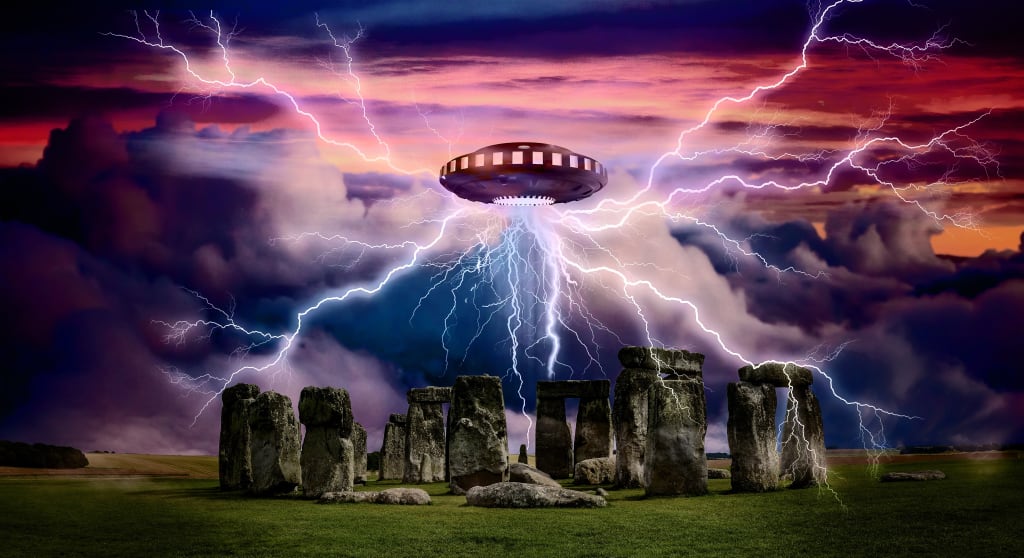The Cosmic Origins of Humanity: Tracing Our Existence Beyond Earth
Are We a Celestial Experiment? Exploring the Possibility of Extraterrestrial Scientists as the Source of Human Life

Introduction
The enigmatic question of the existence of God or gods has fascinated humanity since the dawn of time. As our understanding of the cosmos expands, a new dimension is added to this age-old conversation: could we, as a species, owe our existence to extraterrestrial scientists rather than divine beings? This notion, far from being a modern construct, has its roots in ancient religious texts and historical accounts.
Humanity's Anomalous Nature
Unlike other species on Earth that engage in a symbiotic relationship with their environment, humans often deplete resources and disrupt the natural balance. This peculiar characteristic raises the possibility that we may not be a native species to Earth, but rather a product of celestial engineering.
The idea of extraterrestrial beings delivering humans to Earth is not new or limited to the realms of science fiction. Ancient religious texts, such as the Old Testament and the Judaic Torah, contain accounts of otherworldly visitations. The story of Ezekiel, for instance, describes a mysterious 'chariot' that has led scholars to consider the possibility of an alien encounter.
Similarly, the astonishing architectural feats of Stonehenge, the pyramids, and the legends of Atlantis imply a connection with something beyond human understanding. These structures and stories, often linked to the intervention of 'sky-gods,' may hold clues about the true origins of humanity.
Extraterrestrial Life in Mythology and Religion
Many ancient cultures feature tales of gods and goddesses descending from the heavens to interact with human beings. These stories often involve the sharing of knowledge or the bestowing of gifts upon humanity. The Sumerian civilization, which existed in modern-day Iraq, had a pantheon of gods called the Anunnaki. According to Sumerian mythology, these beings came to Earth from the heavens and played a vital role in shaping human civilization, imparting knowledge of agriculture, law, and the arts.
The ancient astronaut theory posits that the gods and goddesses from various mythologies were, in fact, extraterrestrial visitors. Proponents of this theory argue that advanced beings from other planets may have visited Earth and directly influenced human history, shaping our beliefs, culture, and technological development.
Ancient Architectural Wonders: Evidence of Extraterrestrial Influence?
The world is filled with remarkable structures that continue to baffle modern scientists and engineers. These marvels of architecture and engineering may serve as evidence of extraterrestrial intervention in human history.
The Great Pyramid of Giza, for example, is an architectural wonder that has puzzled researchers for centuries. The precision with which it was built, the alignment with celestial bodies, and the advanced mathematical knowledge required for its construction all suggest that the ancient Egyptians may have had access to knowledge far beyond their time.
Similarly, Stonehenge, a prehistoric monument in England, demonstrates an incredible understanding of astronomy and geometry. The stones are aligned with the solstices and other celestial events, indicating a deep knowledge of the cosmos.
The Nazca Lines in Peru, another enigmatic ancient site, consists of massive geoglyphs etched into the ground, visible only from high above. These intricate designs, depicting animals and geometric shapes, have led some to theorize that they were intended as messages or signals for extraterrestrial visitors.
Scientific Perspectives on Extraterrestrial Life
The search for extraterrestrial life has intensified over the past few decades, with advances in technology allowing us to explore the cosmos in ways previously unimaginable. Scientists have discovered thousands of exoplanets - planets orbiting stars outside our solar system - many of which reside within the habitable zone, where conditions might be suitable for life. The potential for life beyond Earth has never seemed more plausible.
Astrobiologists and astronomers have developed various methods to detect potential extraterrestrial life, including the search for biosignatures – chemical signs indicative of life – in the atmospheres of exoplanets. Additionally, the search for extraterrestrial intelligence (SETI) has been actively scanning the skies for radio signals from other civilizations.
While no concrete evidence of extraterrestrial life has been found to date, the sheer number of exoplanets and the vastness of the universe suggest that the likelihood of other intelligent life forms is high. This raises the possibility that our own existence might be linked to these yet-to-be-discovered beings.
The Panspermia Hypothesis
Panspermia is a theory that suggests life on Earth may have originated from microscopic organisms or biochemical compounds transported through space, either via comets, meteorites, or other celestial bodies. This hypothesis posits that life could have spread across the cosmos, planting the seeds for life on multiple planets, including Earth.
If the panspermia hypothesis holds true, it could mean that life on Earth has extraterrestrial origins, even if it evolved independently once it arrived on our planet. This idea further reinforces the notion that humanity might owe its existence to cosmic influences.
The Fermi Paradox and the Great Filter
The Fermi Paradox is the apparent contradiction between the high probability of extraterrestrial life in the universe and the lack of contact or evidence for such civilizations. One possible explanation for this paradox is the concept of the "Great Filter," a theoretical barrier that prevents the development of advanced, spacefaring civilizations.
The Great Filter could be a series of improbable events or catastrophes that are difficult for any civilization to overcome. If humanity has already passed the Great Filter, it would mean that we are one of the few species to have successfully navigated these challenges, making contact with other intelligent life less likely. Alternatively, if the Great Filter still lies ahead of us, our future as a species could be in jeopardy.
Conclusion
The possibility of extraterrestrial life and its potential influence on human history has captivated our collective imagination for centuries.
While the question of our cosmic origins remains unanswered, it is essential to remain open to the idea that our celestial neighbors may have played a role in shaping humanity as we know it.
As we continue to explore the cosmos and unravel its mysteries, the search for extraterrestrial life remains a driving force in our quest for knowledge.
With each new discovery, we come closer to understanding our place in the universe and the origins of life on Earth.
In the meantime, the enigmatic question of our existence persists, fueling our curiosity and inspiring us to reach for the stars.





Comments
There are no comments for this story
Be the first to respond and start the conversation.